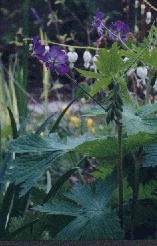
Free plants at Curbside -- 26-May-1999
Here's the photos and descriptions of the plants put out at curbside
on 26-May-1999.
This page is for reference, there may no longer be any of these left.
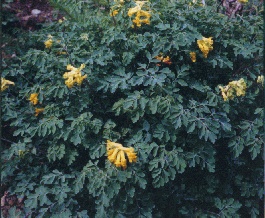 Corydalis Lutea (small yellow flowers)
Corydalis Lutea (small yellow flowers)
There are several different Corydalis, this is a yellow version. It
will easily spread to little clumps everywhere, but it is also very
easy to get rid of, simply pull the small plants. It is drought
tolerant, and is happy with partial sun.
Any individual plant will only get to 8" high, by about 6" wide.

Geranium
{Purple flowers in foreground of photo.}
Although you may be more familiar with annual Geraniums, this one is a
Perennial which will come back each year.
Grows somewhat leggy to a few feet tall. Naturalizes well and is very
tolerant of any conditions.
 Acanthus (probably A. spinosus, common name: Spiny Bear's Breech)
Acanthus (probably A. spinosus, common name: Spiny Bear's Breech)
The short deep green wide-leafed plant will become this monster with
two-layered purple and white flowers! (Only two leaves are visible
near the bottom of the photo.) This plant is on the north side of a
fence, thus never gets any sunlight (thus the grainy photo) -- a very
useful plant. The leaves may wilt and look terrible after you first
plant them, but don't worry -- water immediately and they'll perk up in
a day or two. These grow from tubers, so if you decide to move them
later, make sure you dig up the entire tuber--more plants will sprout
from a very small piece of root, making it hard to get rid of.
In full flower may reach 5' high, takes about 3' ground space.
 Rubus (common name: Raspberry)
Rubus (common name: Raspberry)
Raspberries come in two types -- "everbearing" and June bearing. The
plants we have out may be either, I'm sorry but I can't tell them
apart either! Beware that raspberry plant roots are very invasive
and will suddenly shoot up new plants as much as several feet from the
original plant. I highly recommend using "root barrier" around
raspberry plantings (ask at any garden shop) -- you've been warned!
Given free reign these may get to 10' tall! They'll need some water
but not a lot. Lots of sun is best. If the plants bear fruit all
summer (everbearing), break off and pull out any old dead wood in the
fall. If they bear only a single heavy crop in early summer (June
bearing), leave the tall canes in the fall -- fruit will be borne on
one year old wood the following spring.
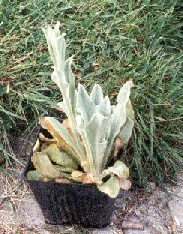
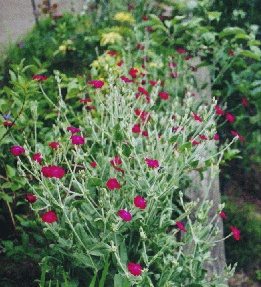 Lychnis Coronaria
Lychnis Coronaria
This is a great plant for those difficult areas. It's attractive in
the winter, keeping its silvery foliage all year. In the spring it
suddenly triples in size and shoots up stems (up to 2 feet tall) with
single, carnation-like hot pink flowers. It reseeds itself easily,
and will grow almost anywhere.
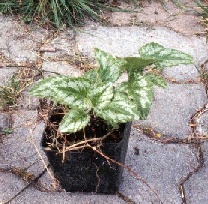 Lamium (variegated groundcover)
Lamium (variegated groundcover)
This will spread quickly and firmly by above-ground runners. Just be
sure to trim off runners that are going where you don't want them to
be. It doesn't seem to mind permanent shade, or clay soil.